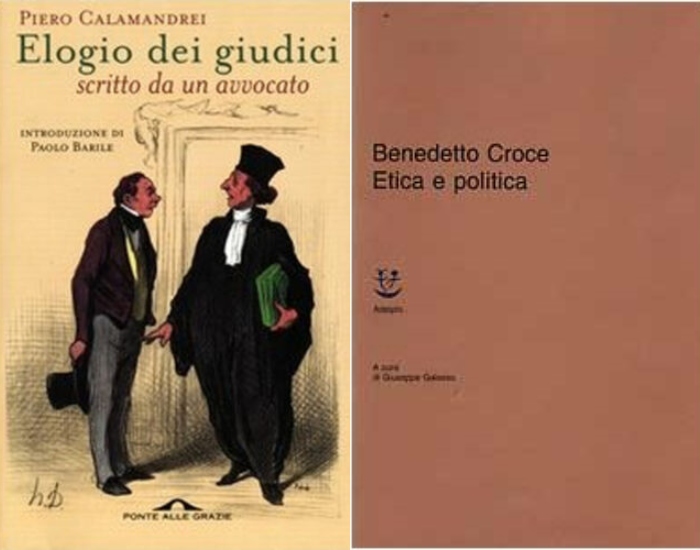Calamandrei, Falcone, Cassese and the reform of justice. Croce and political honesty

Michael the Great's Notepad
"Judicial error is sometimes the unconscious effect of a sin of pride: the magistrate who has chosen a path refuses to listen to the reasons of those who want to prove to him that it is wrong, because he is convinced that if he having taken it, the dignity of justice would suffer. He believes that justice is at stake, while only his self-respect is at stake: without realizing it, by obstinately pursuing his thesis, he has transformed himself from a judge into a party" (Piero Calamandrei, "Elogio dei Giudici Written by a Lawyer" , 1935)
****
“Timidly, therefore, and amid much hesitation and concern, the awareness begins to make its way with difficulty that the regulation of the functions and of the career itself of prosecutorial magistrates can no longer be identical to that of the judging magistrates, since the functions and, therefore, the aptitudes, the mental habitus, the professional skills required for the performance of such different tasks: the public prosecutor is an investigator in all respects, the judge arbiter of the dispute. We need to move along this direction, setting aside the bogeyman of the public prosecutor's dependence on the executive and of the discretionality of criminal prosecution, which is punctually heralded whenever there is talk of career differentiation.
To disregard the specificity of the prosecutorial functions with respect to the judging ones, in the antihistorical attempt to continue to consider the judiciary as a unit, paradoxically amounts to less guaranteeing the same independence and autonomy of the judiciary, constitutionally guaranteed both for the prosecutorial bodies and for the judicial bodies" ( Giovanni Falcone, "The stake. Interventions and proposals for the fight against the mafia", Rizzoli, 2010).
****
“In Italy, it is difficult to reform the justice system because there is no longer a separation of powers. The government has become a legislator. Parliament became administrator. The judges exercise administrative functions, occupying the serving offices of the CSM and the Ministry of Justice, and the legislative function with their presence in the ministerial cabinets". The Nordio reform is “a good start, as long as it continues. The millions of pending lawsuits show that there is a demand for justice that is not being met. This is reflected in the rapidly declining public confidence in the judiciary as measured by polls. If the judiciary fails to clear the backlog quickly, promptly responding to the question of those who have approached the judges, the entire body of the judiciary will eventually lose completely the trust that the public should have in justice. Justice that comes late is not justice. And a justice that loses the trust of citizens risks not being so” (Sabino Cassese, interview with Quotidiano Nazionale , 17 June).
****
In a famous note on political honesty published in 1931, Benedetto Croce narrates the adventures of Charles James Fox. It is the great English statesman, who lived in the second half of the eighteenth century, who was responsible for the treaty which in 1783 recognized the independence of the American colonies. Devoted to gluttony and debauchery of all kinds, once he came to power he tried to become an upright man of moderate morals. However, when he feels his oratory vein and his fighting energy weaken, he quickly returns to his old habits to regain those strengths.
One can deplore, Croce comments, such an unhappy physiological and psychological constitution, which needed questionable stimulants to act. However Fox, he adds, certainly benefited his country, although "fathers of families with equal prudence should have denied him their daughters in brides." But, he concludes, it is also true that "this disharmony between properly political life and the rest of practical life cannot go too far, because, if nothing else, the bad reputation produced by the second, reworking on the first, puts it in the way […] or the moral hypocrisy of the adversaries can use it as a poisoned weapon. But this is another matter” (“ Ethics and politics”, Adelphi, 1994).
This is a machine translation from Italian language of a post published on Start Magazine at the URL https://www.startmag.it/mondo/calamandrei-falcone-cassese-e-la-riforma-della-giustizia-croce-e-lonesta-politica/ on Sat, 24 Jun 2023 05:51:42 +0000.
